
Consensus statement
IDF Consensus Worldwide Definition of the Metabolic Syndrome
Published in 2006, the IDF Worldwide Definition of the Metabolic Syndrome provides physicians with the tools to quickly identify those at risk and also compare the impact across nations and ethnic groups.
attachments-30.pdf
pdf
741KB

Consensus statement
IDF consensus definition of metabolic syndrome in children and adolescents
Published in 2005, this first simple, unified definition of the metabolic syndrome for children and adolescents developed by IDF is consistent with that available for adults.
attachments-31.pdf
pdf
407KB

Consensus statement
IDF Consensus Statement on Sleep Apnoea and Type 2 Diabetes
Published in 2008, this IDF consensus statement on sleep apnoea and type 2 diabetes aims to raise awareness of the association between the two conditions, which have significant implications on public health and on the lives of individuals.
attachments-32.pdf
pdf
374KB

Guideline
International Curriculum for Diabetes Health Professional Education
Published in 2008, this curriculum is designed to meet the needs of local health professionals, institutions and organisations, and adapted to suit local contexts. It was originally developed in response to the need for health professionals to have specialised, evidenced-based training in diabetes education.
attachments-33.pdf
pdf
1MB

Guideline
International Standards for Education of Diabetes Health Professionals
Published in 2015, The International Standards for Education of Diabetes Health Professionals are intended for use by institutions that currently provide or wish to provide a health professional diabetes education programme.
attachments-34.pdf
pdf
226KB

Guideline
IDF Peer Leader Training Manual
Published in 2011, this training manual is intended to train peer leaders to provide on-going diabetes self-management support (DSMS).
attachments-35.pdf
pdf
889KB

Toolkit
KIDS Diabetes Information Pack
The KiDS information pack provides guidelines for the management of children with diabetes and healthy habits to prevent type 2 diabetes. Available for download at https://kids.idf.org/resource.

Guideline
KiDS educational guide on nutrition and diabetes in schools
This guide is an awareness and information tool created to inform teachers, parents of children with diabetes as well as all parents and children of the important role of nutrition in the management and prevention of diabetes.
Available for download at https://kids.idf.org/resource

Guideline
IDF GDM Model of Care Implementation Protocol
The IDF GDM Model of Care was piloted in seven (urban and rural) collaborating health centres in Tamil Nadu State (South India), from June 2012 to December 2015. It was developed using best practice of care and established clinical guidelines.
attachments-47.pdf
pdf
1MB

Guideline
Global Guideline for Managing Older People with Type 2 Diabetes
Published in 2013, this guidelines has been developed to provide health professionals with recommendations that assist in clinical management of a wide range of older adults living with type 2 diabetes.
attachments-48.pdf
pdf
988KB

Guideline
Global Guideline for Type 2 Diabetes
Published in 2012, this guideline represents an update of the first IDF guideline published in 2005, extending the evidence base by including new studies and treatments that emerged since the original guideline.
attachments-49.pdf
pdf
563KB

Guideline
Global IDF/ISPAD Guidelines for Diabetes in Childhood and Adolescence
Published in 2009, this guideline developed by IDF and ISPAD outlines the extensive evidence that exists on the optimal management of type 1 diabetes, while highlighting that such care is not reaching many people who could benefit.
attachments-50.pdf
pdf
955KB

Guideline
Management of Postmeal Glucose
Published in 2011, the purpose of this guideline is to consider the evidence on the relationship between postmeal glucose and glycaemic control (HbA1c) and diabetes outcomes. Based on this information, recommendations for the appropriate management and monitoring of postmeal glucose in type 1 and type 2 diabetes have been developed.
attachments-51.pdf
pdf
383KB

Guideline
Oral Health for People with Diabetes
Maintenance of proper oral hygiene for good oral health is an accepted part of the normal recommendations for a healthy lifestyle. Poor oral hygiene is associated with gingivitis, which can progress to more severe infection and inflammation leading to periodontitis. Infectious disease is known to be more common in people with diabetes if blood glucose control is poor, and inflammation is known to be associated with a decrease in insulin sensitivity and thus potentially a worsening of blood glucose control.

Guideline
Pocketbook for management of diabetes in childhood and adolescence in under-resourced countries, 2nd edition
The Pocketbook provides basic background on diabetes in children and clear advice for initial management of diabetic ketoacidosis, initiation of maintenance insulin therapy, complications screening, and other key components of care. It is aimed for practical use in emergency situations and clinics that are developing expertise in managing diabetes in children.
attachments-56.pdf
pdf
1MB

Guideline
Clinical guideline development
Published in 2003, the Guide for Guidelines is intended for all those involved in the care of people with diabetes that wish to prepare guidelines to assist in the delivery of diabetes care, or who wish to draw on the experience of others in developing such guidelines.
attachments-57.pdf
pdf
204KB
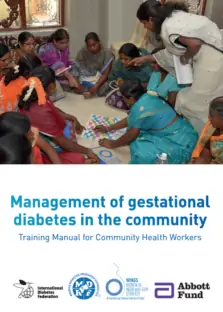
Guideline
Management of gestational diabetes in the community
A training manual for community health workers, developed as part of the IDF Women in India with GDM Strategy (WINGS).
attachments-58.pdf
pdf
1,017KB
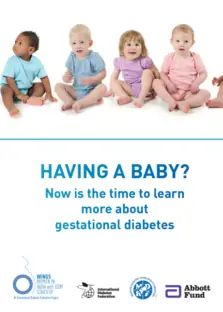
Guideline
Having a baby? Now is the time to learn more about gestational diabetes
An educational manual with information and advice on having a healthy baby.
attachments-59.pdf
pdf
1MB

Report
IDF WINGS Project Summary Report
The IDF Women in India with GDM Strategy (WINGS) project was the first-ever strategy to tackle the rising prevalence of GDM in India. It aimed to develop a context-adapted model approach to care in low-resource settings, confronting the widespread challenges in GDM screening and management.
attachments-60.pdf
pdf
2MB
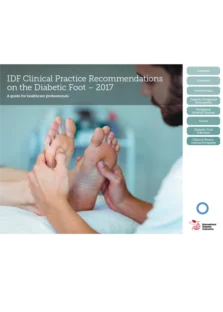
Guideline
IDF Clinical Practice Recommendations on the Diabetic Foot 2017
Simplified and easy to digest guidelines for health professionals, aimed at prioritising early intervention in the diabetic foot with a sense of urgency through education.
attachments-61.pdf
pdf
6MB

Guideline
Diabetic Foot Screening Pocket Chart
Pocket chart with information for health professionals to identify, assess and treat diabetic foot patients earlier in the "window of presentation" between when neuropathy is diagnosed and prior to developing an ulcer. The content is derived from the IDF Clinical Practice Recommendations on the Diabetic Foot 2017.
attachments-62.pdf
pdf
4MB
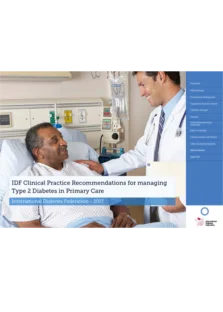
Guideline
IDF Clinical Practice Recommendations for Managing Type 2 Diabetes in Primary Care
Published in 2017, these Clinical Practice Recommendations for healthcare professionals summarise current evidence around optimal management of people with type 2 diabetes.
T2D-primary-care.pdf
pdf
3MB
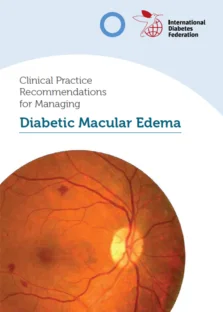
Guideline
IDF Clinical Practice Recommendations for Managing DME
Diabetic Macular Edema (DME) is a potential complication of diabetic retinopathy that currently affects more than 28 million people with diabetes. These Clinical Practice Recommendations are intended to facilitate the work of general practitioners, hospital physicians, and other clinicians working in diabetes-related eye disease management.
Clinical Practice Recommendations for Managing DME
pdf
408KB
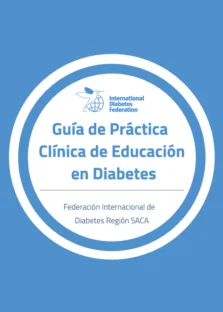
Guideline
IDF SACA Clinical Practice Guideline on Diabetes Education
Produced by the IDF South and Central America (SACA) Region with the aim of standardising evidence-based educational practices to improve the health and well-being of people with diabetes.
attachments-64.pdf
pdf
2MB

Online course
Type 2 Diabetes and the Heart
This free 30-minute course explores the impact of diabetes on heart health, focusing on how high glucose levels can affect the blood vessels and lead to heart issues.
link to https://understandingdiabetes.org/type-2-diabetes-heart/en
Access the course

Online course
Type 1 Diabetes: Overview, Treatments and Targets
This free 25-30 min course offers an overview of what type 1 diabetes is, how it develops, the necessity of daily insulin, and the effects of lifestyle factors on blood glucose levels.
link to https://understandingdiabetes.org/type1-diabetes/en
Access the course

Online course
Insulin and how to use it safely
In this free 25-30 minutes course you will learn what insulin is and why people living with type 1 diabetes and some people living with type 2 and gestational diabetes need to take it.
link to https://understandingdiabetes.org/insulin-safely/en
Access the course

Online course
Diabetes and cardiovascular disease
Free online course for health professionals that provides the latest evidence-based clinical recommendations for the management of cardiovascular complications in people with diabetes.
link to https://www.idfdiabeteschool.org/free-courses/diabetes-and-CVD
Access the course

Online course
Diabetic retinopathy
Free online course for healthcare professionals that looks at the complications, risk factors and pathophysiology of diabetic retinopathy (DR), as well as recommended diagnostic tests and management strategies for DR.

Online course
Management of Diabetic Macular Edema (DME)
Free online course for healthcare professionals that covers classification, screening and making referrals for DME, with an overview of risk factors and treatment recommendations.

Online course
Continuous Glucose Monitoring (CGM)
Designed for people living with diabetes and their caregivers, this free 30-minute online course focuses on the role of CGM in diabetes management and provides practical information and tips on CGM use.
link to https://understandingdiabetes.org/continuous-glucose-monitoring/en
Access the course

Online course
Continuous Glucose Monitoring (CGM)
Designed for healthcare professionals, this 60-minute free online course offers an in-depth exploration of CGM, detailing the various types and their functionalities.
link to https://idfdiabeteschool.org/free-courses/continuous-glucose-monitoring
Access the course
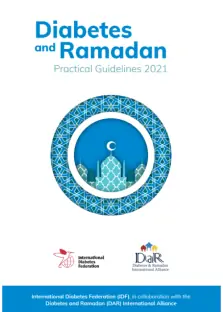
Guideline
Diabetes and Ramadan: Practical Guidelines 2021
These guidelines are intended to provide real-world recommendations to health professionals to support people with diabetes who choose to fast during Ramadan.
IDF_DaR_Practical_Guidelines_Ramadan
pdf
12MB

Guideline
Diabetes and Ramadan: Guide to a Safe Fast
This guide for people with diabetes who choose to fast during Ramadan provides information on the associated risks and complications of fasting and tips on blood glucose monitoring during a fast.
link to https://idf.org/media/uploads/2024/08/DAR-guide-to-safe-fast-EN.pdf
pdf 350kb

Continuous Glucose Monitoring (CGM) Advocacy Resources
Download our free guide to diabetes advocacy organisations supporting people living with diabetes. We regularly update and expand this information.
CGM Advocacy Resources
pdf
449KB

Online course
Biosimilar insulins
Free IDF School of Diabetes online course for healthcare professionals that provides the latest advanced guidelines on the availability of affordable insulin options and the effective use of biosimilars to support diabetes management and promote self-management.
link to https://www.idfdiabeteschool.org/free-courses/biosimilar-insulins

Online course
Type 2 diabetes - Oral agents fact-checking
A free IDF School of Diabetes online course for healthcare professionals that provides a customised set of modules on the management of type 2 diabetes using oral glucose-lowering agents.
link to https://www.idfdiabeteschool.org/premium-courses/t2dm-oral-agents-fact-checking

Online course
Nerve health and diabetes
Free online course designed for people with diabetes and their carers to help understand the impact of diabetes on nerve health and delay or prevent nerve complications.
link to https://understandingdiabetes.org/nerve-health/en
Access the course
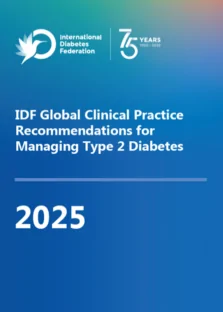
IDF Global Clinical Recommendations for Type 2 Diabetes Management
These Clinical Practice Recommendations incorporate the latest evidence and advancements in diabetes care and provide a structured yet adaptable framework for healthcare professionals, ensuring they are equipped with practical guidance tailored to diverse clinical settings.
link to https://idf.org/what-we-do/education/idf-clinical-practice-recommendations-for-type-2-diabetes-2025/
Download